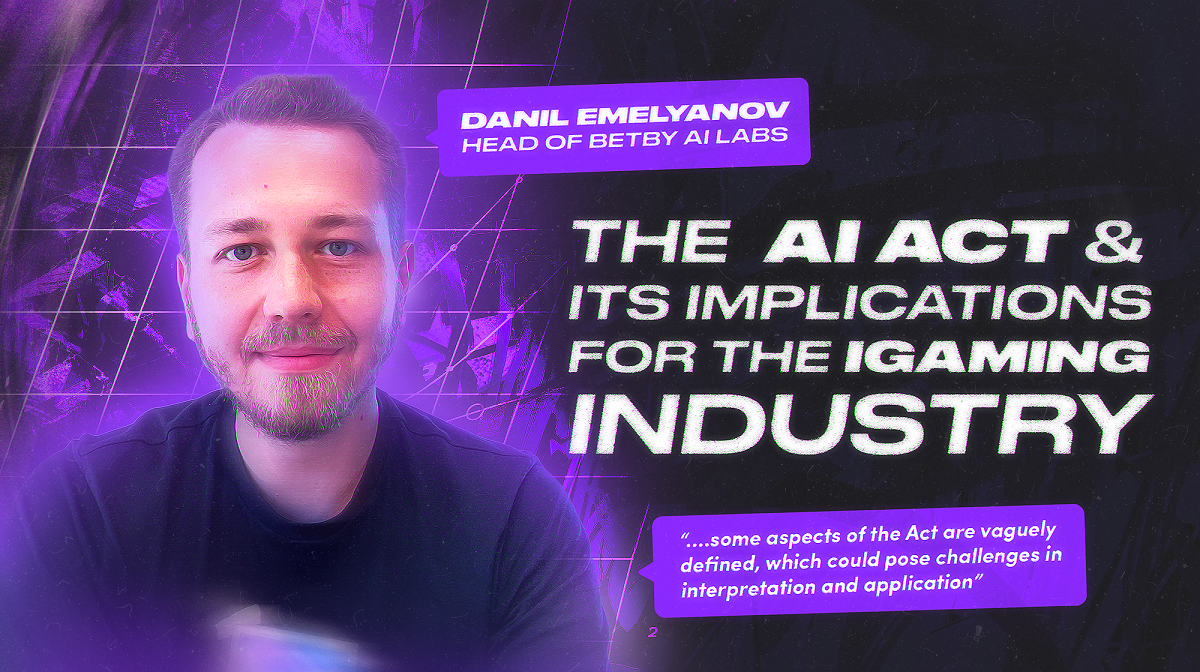Compliance Updates
THE EU AI ACT AND ITS IMPLICATIONS FOR THE IGAMING INDUSTRY

By: Danil Emelyanov, Head of AI Labs, Betby
First of all, the regulation of AI is inevitable. The EU was the first to step into this arena with the EU AI Act, setting a precedent that other parts of the world will likely follow. This proactive approach positions the EU as a leader in AI governance, but it also means that regions adopting similar regulations later might benefit from the lessons learned and adjustments made in response to early implementations.
The downside is that those who come last to the regulatory scene might indeed benefit the most. For instance, the competitive landscape in AI innovation currently favors new entrants in the US or UK over Europe, partly due to the stringent compliance requirements of the EU AI Act. This regulation could potentially affect the flow of investments into European AI ventures, making regions with more flexible or yet-to-be-defined regulations more attractive for AI start-ups and investors.
However, the positive aspect is the collaborative approach the EU has taken in drafting this legislation. It’s not a one-way mandate from legislators to businesses; rather, it involves dialogue and input from various stakeholders, including tech companies and open-source communities. Notably, there are exemptions for open-source AI models, likely influenced by contributions from French and German tech firms like Mistral and Aleph Alpha, which have been vocal about the importance of open-source innovation.
The AI Act predominantly focuses on regulating foundation models rather than classic machine learning models. The legislation sets a computational power threshold at 10^25 floating-point operations per second (FLOPS), below which AI systems are generally exempt from stringent regulations. This threshold implies that unless an organization is training a model on the scale of GPT-3.5 or larger, compliance concerns are minimal. This serves as a reminder of the value of simpler machine learning techniques like logistic regression and random forests, which can effectively solve business problems without the complexity and regulatory scrutiny of more advanced models.
For the iGaming industry, the implications of the EU AI Act are relatively manageable. Our legal teams will diligently study the law to ensure compliance, even if it means a slight reduction in the accuracy of our models. This cautious approach is necessary because the fines for non-compliance are substantial, ranging from 1.5% to 7% of global turnover, depending on the severity of the offense and the size of the company. Additionally, some aspects of the Act are vaguely defined, which could pose challenges in interpretation and application.
Despite these challenges, the iGaming sector should remain vigilant. Staying informed about regulatory updates and actively engaging with the regulatory process can help mitigate risks and ensure smooth compliance. The EU AI Act sets high standards for transparency, accountability, and ethical AI use, which, whilst demanding, also push the industry towards more responsible AI deployment.
-

 Africa5 days ago
Africa5 days agoNew Governing Board of the Gaming Commission of Ghana Sworn in
-

 Africa6 days ago
Africa6 days agoBetKing Delivers Healthcare Services and Nutrition Support to Underserved Nigerian Communities
-

 Asia6 days ago
Asia6 days agoQTech Games strengthens its elite suite with Bigpot Gaming
-

 Industry News7 days ago
Industry News7 days agoREGISTRATION NOW OPEN FOR GLOBAL GAMING EXPO 2025
-

 Baltics7 days ago
Baltics7 days agoBetsson Group Rolls Out Its Flagship Offering in Lithuania
-

 Asia5 days ago
Asia5 days agoMacau Government Extends Lottery Concession of Macau Slot Until 5 June 2026
-

 Latest News5 days ago
Latest News5 days agoWeek 26/2025 slot games releases
-

 Africa5 days ago
Africa5 days agoQTech Games hires Ekaterina Mayorova as sales lead for Africa & Eastern Europe

































